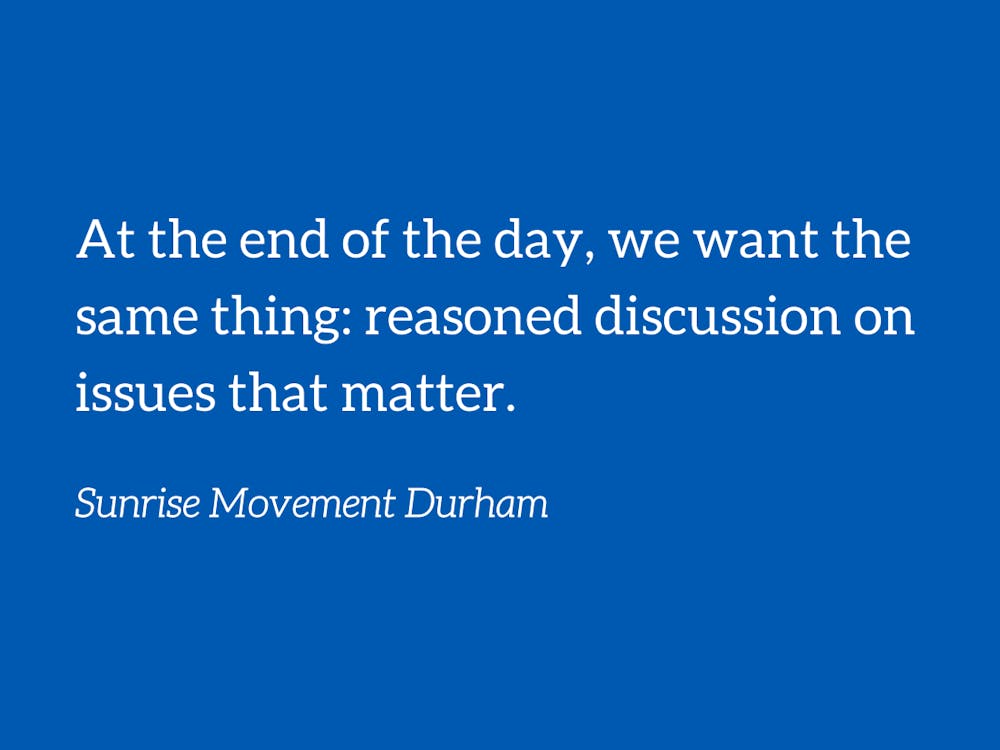It is ironic that those who profess to care the most about free speech are the first to recoil in the face of criticism. Unfortunately, this irony is lost on Professor Bruce Caldwell, who in a recent response to an open letter from Duke faculty and Sunrise Durham, attempts to twist a clear case against a speaker’s message and academic credentials into a question of free speech.
This consistent mischaracterization compels us to clarify the issues at hand. Let’s consider each of the misdirections in turn.
Caldwell first claims that by condemning the decision to invite Lomborg, we are attempting to "censor” the speaker, denying him the ability to express his views. Equating the lack of an invitation with censorship is absurd. Lomborg has an excess of platforms to spread his message; a lack of invitation from Duke would hardly silence him. Kim Kardashian was not invited to speak on climate change, yet we do not accuse Caldwell of silencing her (although her views are far more coherent than Lomborg's). Had Professor Caldwell read our letter, he would see we clearly state that Lomborg “is free to share these conclusions via whatever platform he is given.” However, to be paid as an academic thinker to speak under the Duke banner, one must meet basic standards of academic honesty. Lomborg, having been repeatedly and thoroughly discredited, does not.
Caldwell then points out that the talk was not directly funded by Charles Koch. This again misquotes us: we stated that the Center for the History of Political Economy is funded by Koch, which is a fact. He also claims that funders do not “impose their ideological agenda on the Center.” We do not think nor did we claim that Charles Koch is ghostwriting CHPE content, yet the influence of moneyed interests on academic work is well documented and pervasive. Here as in similar institutes around the country, donors cherry-pick work to fund that aligns with their political agenda. With the stakes as high as they are with climate change, we cannot afford to ignore the fact that Lomborg’s work fits a clear pattern, one that serves political interests far more than scholarly or scientific advancement.
Caldwell finally acknowledges we make a number of “serious claims” about the speaker's integrity, but states that Lomborg “categorically denied” some of them at his talk. We do indeed cite the extensive findings of academic experts on climate change on Lomborg’s writings. These findings are not in dispute, whether Lomborg denies them or not: he has been sanctioned for scientific misconduct on multiple occasions, including by a Danish government committee, which found his work riddled with a diverse range of falsehoods, eventually dismissing the case on the grounds that he had no credentials to speak as an expert on the topic in the first place. In fact, Professor Stuart Pimm of the Nicholas School served as the senior plaintiff in the first case which found Lomborg guilty of scientific dishonesty in 2003, and his rap sheet has only grown since then. In the academic community, we value peer review, and when given the chance, his scholarly peers have time and time again shown Lomborg the door.
At the end of the day, we want the same thing: reasoned discussion on issues that matter. The Duke Community Standard calls on us to not lie, cheat, or steal in our academic endeavors. We long for a day when speakers are held to the same standard when it matters most, regardless of funding. Until then, we will continue to call out the blatant hypocrisy of an institution that claims to be serious about fighting climate change while supporting those who resort to lies to minimize it.
Signed,
Sunrise Durham
Get The Chronicle straight to your inbox
Signup for our weekly newsletter. Cancel at any time.

